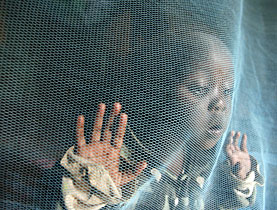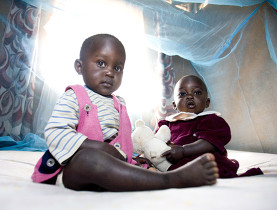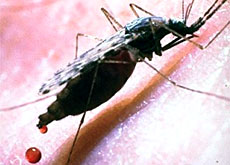Potent new experimental malaria drug emerges

Scientists have identified a new experimental malaria drug able to cope with resistant strains of the deadly disease with just one dose.
The discovery of the drug by a Swiss-led international team is particularly timely, as experts have reported in Asia the first signs of resistance to artemisinin, the essential ingredient of malaria treatments for millions of patients annually.
In laboratory tests the new experimental anti-malarial drug, NITD609, which belongs to a new class of compounds called spiroindolones, killed the two most common parasites responsible for malaria, Plasmodium falciparum and Plasmodium vivax, including a range of drug-resistant strains.
Matthias Rottmann, lead researcher from the Swiss Tropical Institute in Basel, said the discovery was highly promising.
“It can be applied orally, so it is available in the blood stream at levels that can kill the parasite; it’s very potent and there are no side effects,” he told swissinfo.ch.
In experiments on mice with malaria, the team found that NITD609 works in a different way from other antimalarial drugs and that one oral dose was enough to clear the disease.
Current treatment methods require patients to take drugs between one and four times daily for three to seven days. Reducing the treatment to a single dose leaves less opportunity for the parasites to develop a resistance to the drug, researchers said.
Desirable features
Scientists screened 12,000 chemicals before they singled out NITD609 as a potential drug candidate.
Anthony Fauci, director of the American National Institute of Allergy and Infectious Diseases, said the experimental compound had several “desirable features,” including that it targets a parasite protein not attacked by any existing malaria drugs.
NITD609 also has properties which could enable it to be produced in pill form and in large quantities.
“From the beginning, NITD609 stood out because it looked different, in terms of its structure and chemistry, from all other currently used antimalarials,” said Elizabeth Winzeler, also with the NIH, who worked on the team.
Evaluations will continue this year and if all goes smoothly the drug could be ready for clinical trials in 2011.
Alarm bells in the Mekong
Malaria affects between 250-500 million people annually and kills nearly a million a year, mostly young children and pregnant women in sub-Saharan Africa.
It is caused by a parasite of the Plasmodium species transmitted from the blood of an infected person and passed to a healthy human by mosquitoes.
The potential new breakthrough is timely as it has been more than a decade since a new class of malaria drugs began to be widely used and the parasite has demonstrated an ability to outwit existing anti-malaria treatments.
Resistance to chloroquine and sulfadoxine-pyrimethamine, the cheapest malaria drugs, is becoming more common. The best treatments for malaria are artemisinin combination therapy (ACT) drugs, but they are up to 40 times more expensive than the older failing drugs.
But last year alarm bells were raised when WHO warned that parasites resistant to arteminisim had emerged along the Thai-Cambodian border, posing a serious threat to global control efforts. This was the same region where chloroquine first began to fail in the 1950s before it moved westwards and lost effectiveness in Africa. It is feared the same could happen with arteminisim.
“If we lose this one we would lose an important piece of the anti-malaria control programme worldwide,” said Thierry Diagana, from the Novartis Institute for Tropical Diseases in Singapore.
The new drug would not replace artemisinin, said Rottmann, but new compounds with a new mode of action are urgently needed to prevent the spread of the potentially resistant parasite.
“Tremendous” progress
Robert Newman, director of the Geneva-based Global Malaria Programme at WHO, said the new discovery was “encouraging”.
“We have to stay one step ahead of this parasite,” he said.
But there is still not enough investment being made in malaria R&D, he bemoaned.
“Significant increases are needed to speed up the timetable, as promising candidates to replace ACTs are many years away.”
On the whole, “tremendous” progress has been made over the past decade in controlling malaria thanks to substantial increase in funding – up to $1.5 billion (SFr1.52 billion) in 2009 – he said.
This has resulted in a rapid increase in malaria-control prevention via the availability of long-lasting insecticide-treated mosquito nets, targeted indoor spraying and modest increases in access to ACTs.
In countries that have scaled up malaria control, such as Eritrea, Sao Tomé and Principe, Rwanda and Zambia, rates of malaria cases, hospital admissions and deaths have dropped by more than 50 per cent.
But the funding still falls short of the projected $6 billion needed annually for global malaria control.
“We need to advocate for more resources to finish the job,” said Newman.
Simon Bradley, swissinfo.ch
Almost half the world’s population is exposed to malaria, which kills nearly a million people a year, mostly young children under the age of five and pregnant women in sub-Saharan Africa.
The economic impact of the disease is immense, causing lost days of work and loss of tourism and investment.
There are four main types of malaria, all spread by mosquitoes.
Malaria is caused by a parasite of the Plasmodium species and is transmitted by the bite of a female Anopheles mosquito.
Many drugs have lost their effectiveness against the parasite as it adapts. There is no vaccine but advanced testing is underway of one that could offer partial protection.
Insecticide-treated bed nets and indoor spraying of houses with insecticides are two methods of keeping the Anopheles mosquito at bay.
Currently, the most effective drugs are combination treatments containing artemisinin – derived from a plant that has been used for centuries in traditional Chinese medicine to treat fever.
Malaria has been largely beaten in the richer parts of the world, with 108 countries free from the disease, but tackling the disease in poor and tropical countries is more difficult.

In compliance with the JTI standards
More: SWI swissinfo.ch certified by the Journalism Trust Initiative















You can find an overview of ongoing debates with our journalists here . Please join us!
If you want to start a conversation about a topic raised in this article or want to report factual errors, email us at english@swissinfo.ch.